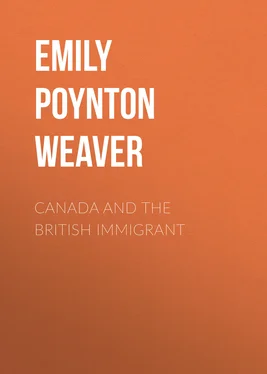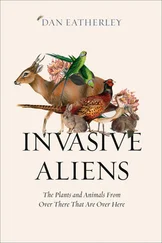Emily Poynton Weaver - Canada and the British immigrant
Здесь есть возможность читать онлайн «Emily Poynton Weaver - Canada and the British immigrant» — ознакомительный отрывок электронной книги совершенно бесплатно, а после прочтения отрывка купить полную версию. В некоторых случаях можно слушать аудио, скачать через торрент в формате fb2 и присутствует краткое содержание. Жанр: Путешествия и география, История, foreign_edu, foreign_antique, foreign_prose, на английском языке. Описание произведения, (предисловие) а так же отзывы посетителей доступны на портале библиотеки ЛибКат.
- Название:Canada and the British immigrant
- Автор:
- Жанр:
- Год:неизвестен
- ISBN:нет данных
- Рейтинг книги:3 / 5. Голосов: 1
-
Избранное:Добавить в избранное
- Отзывы:
-
Ваша оценка:
- 60
- 1
- 2
- 3
- 4
- 5
Canada and the British immigrant: краткое содержание, описание и аннотация
Предлагаем к чтению аннотацию, описание, краткое содержание или предисловие (зависит от того, что написал сам автор книги «Canada and the British immigrant»). Если вы не нашли необходимую информацию о книге — напишите в комментариях, мы постараемся отыскать её.
Canada and the British immigrant — читать онлайн ознакомительный отрывок
Ниже представлен текст книги, разбитый по страницам. Система сохранения места последней прочитанной страницы, позволяет с удобством читать онлайн бесплатно книгу «Canada and the British immigrant», без необходимости каждый раз заново искать на чём Вы остановились. Поставьте закладку, и сможете в любой момент перейти на страницу, на которой закончили чтение.
Интервал:
Закладка:
The English, neglected by their home government, and having to depend on themselves, proved the better colonizers; advancing gradually, step by step into the wilderness, and generally holding what they gained. The French, on the other hand, though excellent explorers and traders and fighters, pushed far afield, and the population of New France grew slowly compared to that of the English colonies. There was endless fighting between the representatives of the two races, both of which at times sought help from the Indians. The result was a peculiarly merciless warfare, in which women and children were murdered, prisoners tortured, and the little unprotected settlements on the frontiers constantly exposed to dreadful night attacks and the burning of their buildings and crops. The mother countries of both French and English colonists joined frequently in the struggles, and at last (as every British schoolboy knows) Quebec was taken and Canada was conquered.
But it is not so well-known by those who have made no special study of its history that the French in Canada had for years suffered sad misgovernment, many of the officials sent out from France being bent only on making money by fair means or foul. In contrast to these men, the British officers, whose duty it became, on the conquest, to govern the Canadians, seemed eminently fair and just; and the lower classes at least felt that the change was for the better. Many of the gentlemen left the country, but others remained, and the early British governors took great pains to conciliate them and the Roman Catholic priests. By the Quebec Act, which came into effect in 1775, the free exercise of the Roman Catholic religion was secured to the French Canadians as well as the retention of their old system of civil law; but in criminal cases English law was to be followed.
The Act was passed when the “Thirteen Colonies” to the south of Canada and Nova Scotia (which had become a British colony early in the eighteenth century) were on the eve of revolt, and before many months had gone by the United Colonies sent an invading army to try to force Canada to make common cause with them. But the leaders of the Canadian people proved loyal, and the invaders, though they kept up the siege of Quebec through the whole of one winter, were driven out of the country.
At that time the British inhabitants of Canada were very few, but the Revolutionary War was to do a great deal to make it strongly and positively British. Many of the people of the Thirteen Colonies were much averse from the breaking of the ties with England; and numbers of them took up arms on the royal side. When the fortunes of war went against them, many of these United Empire Loyalists were eager to leave a land which had thus cast off the old allegiance that they held dear; and the triumphant revolutionists, partly in fear of their strength, partly in hate born of the long and bitter warfare—in which both sides had been betrayed into many cruel and unjustifiable deeds—were just as eager to thrust them out.
The British government paid vast sums in compensating the Loyalists in some measure for their losses, and in settling them in new homes. Some of them went to England; but thousands made their way to Canada and Nova Scotia, and their coming forms the best answer to the question—“Why is Canada British?”
It is British because its older English-speaking colonies were founded on the idea of “Loyalty” as some of the New England colonies were founded on a demand for religious liberty. The two colonies of New Brunswick and Upper Canada (as Ontario was named at first) owe their existence as separate provinces to the influx of Loyalists towards the close of the eighteenth century; and Lower Canada, Nova Scotia and Prince Edward Island all received large additions to their population. The number of settlers who thus came in from the former British colonies has been estimated at about 45,000.
It should not be forgotten, however, that these people, who had suffered so grievously for their adherence to their old allegiance, were not in the main blind and servile upholders of the throne for its own sake (as many of the royalists of the Stuart times had been), though unquestionably the severance of the Thirteen Colonies from Great Britain had been due in part to the efforts of George III. to become an autocratic monarch. The title bestowed on these Americans who settled in Canada—which is still a matter of pride to their descendants—was that of “United Empire Loyalists;” and always in their minds loyalty to country and empire and their ancient political institutions was associated with their loyalty to the throne.
Not a few of the leaders of the Loyalists had been men of great influence in the older colonies, and it is not surprising that almost from their arrival in what is now the Dominion of Canada, they began to agitate for representative government, and for the British institutions to which they had been accustomed. They were a liberty-loving people; and those who had settled on the St. Lawrence stoutly objected to being obliged to live under the French civil laws, which gave such satisfaction to their Gallic neighbours. They besieged the British government with petitions for a division of the Province, and for the benefit of British law; so in 1791 the old French Province was divided into Upper and Lower Canada. The newcomers thus gained the opportunity to build up a new province on British lines in the almost uninhabited western wilderness; and, having the opportunity, I think they did wonders with it.
In a hundred ways, besides the determination not to accept any limitation of their political liberty, they showed their force and energy of character. The task that faced Canada’s first British pioneers was more strenuous than that which has faced any pioneers since, though the opening and subduing of a new land to the uses of civilized man is always a task that tests to the utmost the manhood and womanhood of those who essay it.
The land was thickly covered with huge trees, and in many places the soil, which the sun’s rays could scarcely ever reach through the shadowy verdure of the woods, was cold and wet and swampy. When the Loyalists came, there were no roads in Upper Canada or New Brunswick. There were no steamboats on the lakes or rivers, no railroads even dreamed of. The monarchs of the forest appeared to those first settlers in the light of enemies, to be put out of the way by axe and fire as speedily as possible, and in many districts the land was savagely stripped bare of woods, in a fashion that those who have come after cannot help regretting. It was only the ashes of the majestic maples and beeches and walnuts which had any value in the eyes of the pioneers. Made into potash these would fetch a little ready money, hardly to be obtained in those early days for any other commodity. Even for wheat, only “store-pay” could usually be obtained, and but a small allowance of that, for the great world’s markets were utterly inaccessible to Canada’s early farmers, and the local demand was very small.
It was the age of home industries, when every man was by turns builder of his own log-house; cabinet-maker of such rude attempts at chairs and tables as he could turn out; farmer of patches of grain amongst the slowly rotting stumps of forest trees; roadmaker, of ways “slashed” through the bush and stretches of corduroy over the swamps.
Meanwhile his wife was not only dressmaker, but spinner and weaver of stout “homespun”; not only housekeeper, but maker of candles and soap; not only cook of the daily meals, but baker of bread, when flour could be got, and contriver of some substitute for it when pounded maize or Indian meal had to be used instead.
And these lists might be extended indefinitely. The people drank tea made from a wild plant growing along the edges of the swamps, and sweetened it with sugar made by boiling the sap drawn in the spring from their own maple trees. Such articles as spoons were cut from bass wood. Shoes were fashioned by the father of the family from the skins of the animals he killed. The arrival, or the making, of the first wheeled vehicle in some settlements was an event, the only kind of conveyance used at first being a rude “sled” drawn by oxen.
Читать дальшеИнтервал:
Закладка:
Похожие книги на «Canada and the British immigrant»
Представляем Вашему вниманию похожие книги на «Canada and the British immigrant» списком для выбора. Мы отобрали схожую по названию и смыслу литературу в надежде предоставить читателям больше вариантов отыскать новые, интересные, ещё непрочитанные произведения.
Обсуждение, отзывы о книге «Canada and the British immigrant» и просто собственные мнения читателей. Оставьте ваши комментарии, напишите, что Вы думаете о произведении, его смысле или главных героях. Укажите что конкретно понравилось, а что нет, и почему Вы так считаете.


![О Генри - Граф и свадебный гость [Черное платье] [The Count and the Wedding Guest]](/books/405331/o-genri-graf-i-svadebnyj-gost-chernoe-plate-th-thumb.webp)









